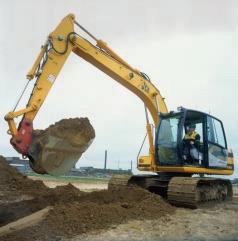
2 minute read
Co.
Legally Speaking
PAY-IF-PAID PROVISIONS IN NEW JERSEY
Recently, the New Jersey Appellate Division affirmed the Superior Court’s decision in Jersey Precast v. Enterprises, Inc. et al. Particularly, the Dec. 7, 2022, decision affirmed the lower court’s finding that a “pay-if-paid” clause in a material supplier’s purchase order with a general contractor was binding and enforceable.The court in Jersey Precast acknowledged that New Jersey has no statute or published case law that addresses the enforceability of “pay-ifpaid” clauses. As such, the court relied upon the authorities and approaches of other jurisdictions. For example, various courts in other states require such a clause to include clear and unambiguous language in order for a “pay-if-paid” to be enforceable. For example, see Main Elec., Ltd. v. Printz Servs. Corp., which states “…the relevant contract terms must unequivocally state that the subcontractor will be paid only if the general contract is first paid by the owner and set forth the fact that the subcontractor bears the risk of the owner’s nonpayment”; and DEC Elec., Inc. v. Raphael Constr. Corp., which states that risk-shifting provisions of a pay-if-paid term must be clear and unambiguous or, if ambiguous, interpreted as setting a reasonable time for payment. Moreover, at the federal level pay-if-paid clauses are typically enforceable where there is express contractual language that clearly demonstrates the intention of the parties to shift the risk of payment from the contractor to the subcontractor. For example, see Fixture Specialists, Inc. v. Global Construction LLC.
Using the above standards as guidance, the Appellate Division in Jersey Precast critically pointed out that in New Jersey, freedom of contract is a “‘is a factor of importance” within “the framework of modern commercial life.” For example, see Whalen v. Schoor, DePalma & Canger Grp., Inc.. It is a “settled principle that parties bargaining at arm’s-length may generally contract as they wish.” To that end, the court held that “parties may make contractual liability dependent upon the performance of a condition precedent.” For example, see Duff v. Trenton Beverage Co. The Appellate Division further articulated that a prohibition against the use of pay-if-paid provisions as conditions precedent in construction contracts should come from the legislature rather than the courts, and as such, held that as long as the contract specifies a clear and unambiguous intent and agreement by the parties to shift the risk of nonpayment, a pay-if-paid provision is enforceable subject to the parties’ implied duty to not frustrate conditions precedent to their performance.
Key Takeaways
It is critical that contractors and subcontractors alike keep in mind that the terms of any such provision in a contract should be clear and unambiguous, particularly with respect to the shifting risk of owner nonpayment. The Jersey Precast case establishes a standard that will enforce contracts between sophisticated parties, including “pay-if-paid” provisions if the agreed upon terms are
BY ALEXANDER AVELLAN
unambiguous. Consequently, subcontractors should continue to be aware of the implications of consenting to a properly written “pay-if-paid” provision, and that by agreeing to the same, subcontractors are assuming the risk of owner nonpayment, which can result in significant financial harm. Importantly, the Appellate Division in Jersey Precast also provided that while a “pay-if-paid” clause may be enforced when the non-payment is solely due to the fault of the owner, if the provision is silent as to situations when non-payment is the fault of the general contractor, a court may rule that the entire provisions is unenforceable to the extent the general contractor is responsible for the owner’s non-payment. Finally, New Jersey’s approach to “pay-if-paid” clauses is distinguishable from New York’s legal standards, which prohibit these clauses as unenforceable waivers of a subcontractor’s statutory lien rights.
Meeting the Training / Consulting Needs for Contruction Since 1985
Par�al list of training programs available
OSHA 10 & 30 hour for Construc�on
Heavy Equipment Operator training & evalua�on (Forkli�, Backhoe, Mini-Excavator)

Site Specific training developed to meet your needs.
Competent Person Trench & Excava�on
Health Hazards in Construc�on
Hazwoper – Hazardous Waste
Construc�on Safety Officer
Fall Protec�on-Competent Person
Construc�on General Safety
Teaching Your Own – Instructor Training
If you don’t see the program you need, let us know and we will develop it specific to you needs








